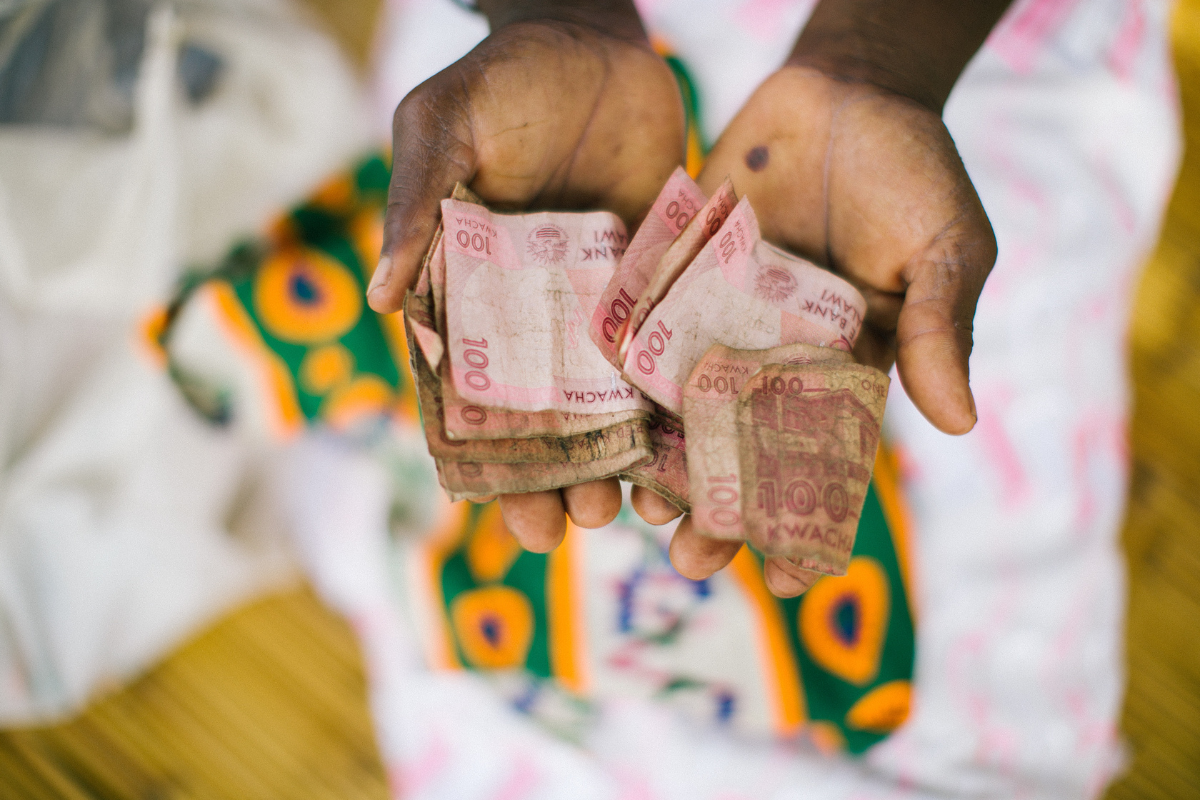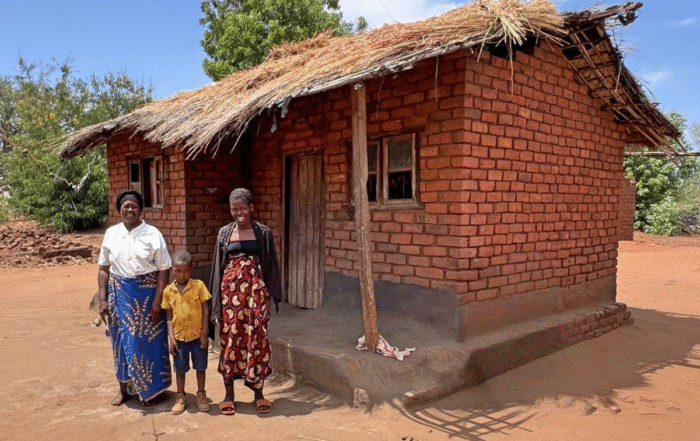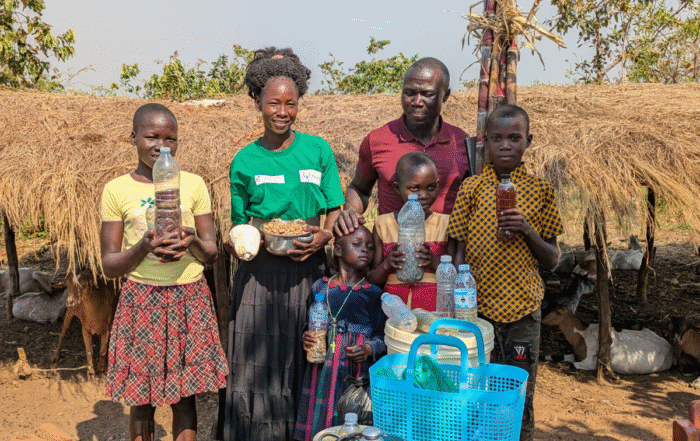3 ways cash distributions are changing humanitarian responses
By Jon Self
August 27, 2024
3 ways cash distributions are changing humanitarian responses
By Jon Self
August 27, 2024

The idiom goes: If you give a person a fish, they eat for a month. If you teach a person to fish, they eat for a lifetime. But what happens when the river has dried up due to shifting weather patterns? Or the path between your home and the river is made impassable by a landslide? If you fear leaving your home because of active conflict? Or an earthquake has destroyed the kitchen where you prepare your meals? In each of these situations, families may need temporary assistance to meet their basic needs before they return to their fishing livelihoods.
In humanitarian crises, food typically rises to the top of the list of needs that families experience. And through our membership in the Canadian Foodgrains Bank – which provides matched funding to World Renew’s food security programming – our local partners are able to help thousands of families put food on the table. In Lebanon, I visited a Syrian refugee family who had enough food that month because of the support from World Renew’s local partner. Eating meant that the father had the energy to work in a nearby field when work was available, earning a small income for his family. What I saw in this family was not a loss of hope or dignity. This family expressed love, gratitude, generosity, and creativity. They demonstrated an incredible capacity to hold onto hope for the future during an impossibly difficult season. In these situations, I believe that World Renew is called to walk alongside people. We are often unable to solve problems – we cannot put an end to conflict – but we can support families in small but meaningful ways.
The role of choice in ending hunger
Foundational to the assistance World Renew provides is dignity. And a central component of dignity is choice; to be able to make decisions about your day-to-day life. Yet in emergencies, choice is often one of the first things to be lost. This is why, in our humanitarian responses, we try to put choice back into the hands of affected communities.
For example, when we respond to a community experiencing food insecurity, one of the first questions we ask families is: In what ways can World Renew support you to have enough food to eat each day? The answers we hear inform the actions we take. In a remote community in South Sudan, cut off from nearby markets due to rains, families might ask to receive physical boxes of food. But in an urban setting like Beirut, Lebanon, families may ask instead for an equivalent amount of cash to purchase the food that they want from a local store. The goal remains the same: to end hunger. Yet how we get there can vary from country to country, and community to community. What is paramount is choice.
What does “cash” look like?
When humanitarians talk about “cash” in humanitarian responses, we are referring to three different methods at the same time.
- As the word suggests, we could be talking about a physical cash distribution: paper currency. Thanks to technological advances, cash may also be deposited directly into people’s bank accounts through mobile phone transfers.
- Cash can also mean printed vouchers that have a cash value redeemable at a local market.
- Cash may be given in the form of an e-card; a debit-like bank card that can be used at a local shop to purchase food.
Over the last decade, humanitarian actors have been learning more and more about providing cash to disaster-affected families. Far from being seen as a hand-out that contributes to dependence on humanitarian aid, we are learning that cash is often the most effective way for affected families to meet their everyday needs. It comes back to choice. Cash distributions allow families to decide what food they want to purchase. It allows families to shop at their preferred market. And it gives flexibility to decide the quantity and quality of ingredients. Amid crisis and uncertainty, cash gives families a choice.
2 ways to utilize cash distributions
We have also learned that the benefits of cash go beyond choice. In Honduras, for example, World Renew is providing food-insecure families with cash that can be used in a local market to purchase food. These markets are not huge chains like Walmart. They are small shops in rural communities typically owned and operated by members of these communities. By purchasing food from these local markets, cash is being re-injected into communities and bolstering the local economy.
Providing cash also reduces the complexity and cost of humanitarian responses so that even more people can receive assistance. When World Renew provides boxes of food, we work with local suppliers to transport food into communities via truck. This costs money and takes time, and in some situations, roads become impassable due to conflict or natural disaster. By providing cash through electronic payments, we can still assist families in these hard-to-reach situations.
The future of cash distributions amid disasters
While cash is not always the best choice – maybe a strong local market is not present, or families prefer in-kind food – it is an increasingly common form of assistance.
In the last three years, World Renew has provided cash in one of its three forms to alleviate food insecurity experienced by over 185,000 people across 10 countries. Through this approach, a greater number of families have been reached due to greater efficiency, many local economies have been strengthened, and more people have been given more choices in their day-to-day lives.
The idiom goes: If you give a person a fish, they eat for a month. If you teach a person to fish, they eat for a lifetime. But what happens when the river has dried up due to shifting weather patterns? Or the path between your home and the river is made impassable by a landslide? If you fear leaving your home because of active conflict? Or an earthquake has destroyed the kitchen where you prepare your meals? In each of these situations, families may need temporary assistance to meet their basic needs before they return to their fishing livelihoods.
In humanitarian crises, food typically rises to the top of the list of needs that families experience. And through our membership in the Canadian Foodgrains Bank – which provides matched funding to World Renew’s food security programming – our local partners are able to help thousands of families put food on the table. In Lebanon, I visited a Syrian refugee family who had enough food that month because of the support from World Renew’s local partner. Eating meant that the father had the energy to work in a nearby field when work was available, earning a small income for his family. What I saw in this family was not a loss of hope or dignity. This family expressed love, gratitude, generosity, and creativity. They demonstrated an incredible capacity to hold onto hope for the future during an impossibly difficult season. In these situations, I believe that World Renew is called to walk alongside people. We are often unable to solve problems – we cannot put an end to conflict – but we can support families in small but meaningful ways.
The role of choice in ending hunger
Foundational to the assistance World Renew provides is dignity. And a central component of dignity is choice; to be able to make decisions about your day-to-day life. Yet in emergencies, choice is often one of the first things to be lost. This is why, in our humanitarian responses, we try to put choice back into the hands of affected communities.
For example, when we respond to a community experiencing food insecurity, one of the first questions we ask families is: In what ways can World Renew support you to have enough food to eat each day? The answers we hear inform the actions we take. In a remote community in South Sudan, cut off from nearby markets due to rains, families might ask to receive physical boxes of food. But in an urban setting like Beirut, Lebanon, families may ask instead for an equivalent amount of cash to purchase the food that they want from a local store. The goal remains the same: to end hunger. Yet how we get there can vary from country to country, and community to community. What is paramount is choice.
What does “cash” look like?
When humanitarians talk about “cash” in humanitarian responses, we are referring to three different methods at the same time.
- As the word suggests, we could be talking about a physical cash distribution: paper currency. Thanks to technological advances, cash may also be deposited directly into people’s bank accounts through mobile phone transfers.
- Cash can also mean printed vouchers that have a cash value redeemable at a local market.
- Cash may be given in the form of an e-card; a debit-like bank card that can be used at a local shop to purchase food.
Over the last decade, humanitarian actors have been learning more and more about providing cash to disaster-affected families. Far from being seen as a hand-out that contributes to dependence on humanitarian aid, we are learning that cash is often the most effective way for affected families to meet their everyday needs. It comes back to choice. Cash distributions allow families to decide what food they want to purchase. It allows families to shop at their preferred market. And it gives flexibility to decide the quantity and quality of ingredients. Amid crisis and uncertainty, cash gives families a choice.
2 ways to utilize cash distributions
We have also learned that the benefits of cash go beyond choice. In Honduras, for example, World Renew is providing food-insecure families with cash that can be used in a local market to purchase food. These markets are not huge chains like Walmart. They are small shops in rural communities typically owned and operated by members of these communities. By purchasing food from these local markets, cash is being re-injected into communities and bolstering the local economy.
Providing cash also reduces the complexity and cost of humanitarian responses so that even more people can receive assistance. When World Renew provides boxes of food, we work with local suppliers to transport food into communities via truck. This costs money and takes time, and in some situations, roads become impassable due to conflict or natural disaster. By providing cash through electronic payments, we can still assist families in these hard-to-reach situations.
The future of cash distributions amid disasters
While cash is not always the best choice – maybe a strong local market is not present, or families prefer in-kind food – it is an increasingly common form of assistance.
In the last three years, World Renew has provided cash in one of its three forms to alleviate food insecurity experienced by over 185,000 people across 10 countries. Through this approach, a greater number of families have been reached due to greater efficiency, many local economies have been strengthened, and more people have been given more choices in their day-to-day lives.







